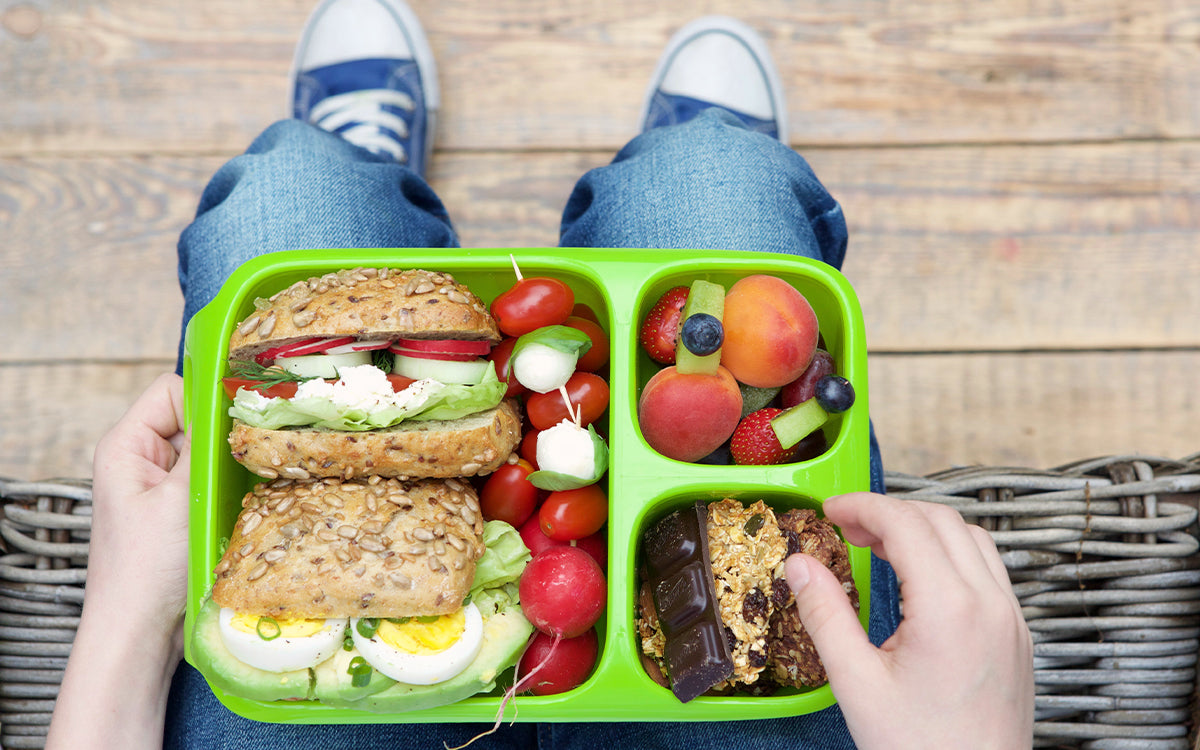
Can Your Lunchbox Help You Beat Bloating?
When you prepare lunch at home, you have control over every ingredient. Restaurant and takeout meals often contain excess salt that makes your body retain water, leaving you puffy and bloated. They also commonly use refined seed oils in cooking, frying, and salad dressings, which can be harder on digestion.
At home, you can swap these for healthy oil and fresh, whole ingredients, making your lunch naturally easier on the gut. Plus, you avoid hidden additives and processed ingredients that may cause discomfort later in the day.
How Can Drinking the Right Beverages Help Flush Out Bloating?
If you’ve had a salty meal, it may sound counterintuitive, but drinking more water helps push out excess sodium and the water your body is holding on to. Hydration also keeps your digestion moving smoothly.
Plain water is great, but herbal teas like dandelion tea or unsweetened green tea can offer additional gentle support for water balance. If bloating is a recurring issue, consider limiting sparkling water, kombucha, and prebiotic sodas, the carbonation can create extra gas in your digestive tract.
Are Salads Always a Safe Bet for Gut Comfort?
Salads are often considered the healthiest lunch option, but not every ingredient is digestion-friendly. Even some healthy veggies like raw onions, beans, quinoa, and cruciferous vegetables can produce gas in sensitive stomachs.
For a gentler salad, choose veggies like romaine, spinach, fennel, celery, cucumbers, carrots, asparagus, avocado, and tomatoes. Adding lightly cooked vegetables can make your salad even easier to digest. For protein, try grilled chicken, tofu, or eggs instead of beans or legumes if these tend to cause you discomfort.
What Should You Know About Deli Meats in Sandwiches?
Deli meat refers to pre-cooked or cured meat products like ham, turkey slices, salami, bologna, or roast beef, often found at grocery store counters or prepackaged. While convenient, they’re usually high in sodium and preservatives, both of which can contribute to bloating.
If you enjoy sandwiches, swap deli meats for freshly cooked proteins such as grilled chicken, tuna, salmon, or even leftover roasted turkey. Pair with whole wheat or homemade sourdough bread for better digestion than refined white bread.
Why Is Feeding Your Gut Bacteria Key to Less Bloating?
Your gut is home to trillions of bacteria, and keeping the good ones thriving helps maintain smoother digestion. Fermented foods like sauerkraut, kimchi, and naturally fermented pickles act as natural probiotics. These can be added to salads or sandwiches for a tangy flavor boost.
However, not everyone’s system responds the same if you have gut issues like bacterial overgrowth, fermented foods might actually increase bloating. Pay attention to how your body reacts.
How Can the Right Protein Powder Make a Difference?
If you occasionally swap lunch for a smoothie, check the label on your protein powder. Many contain dairy concentrates, sugar alcohols, or high-FODMAP ingredients that may cause bloating. Opt for low-FODMAP plant-based blends that digest more smoothly.
Do Portion Sizes Really Matter?
Yes. Even if every ingredient in your lunch is gut-friendly, eating too much at once can overwhelm digestion. Aim for portions that leave you satisfied but not overly full, this reduces the likelihood of post-meal heaviness and bloating.
A Smarter Way to Support Daily Digestive Comfort
Even with the best lunch habits, busy days can make it hard to consistently choose gut-friendly ingredients. That’s where SFG Biome’s Gut Superblend can help.
Formulated with resistant starches, 11.5 billion CFU of clinically studied probiotics, polyphenol-rich phytobiotics, and postbiotics, Gut Superblend is designed to nourish your gut microbiome and naturally supports your overall gut health. By supporting healthy digestion and a balanced gut environment, it helps reduce bloating triggers and maintain a smoother gut balance, making it an easy, once-a-day addition to your routine for long-term digestive comfort.